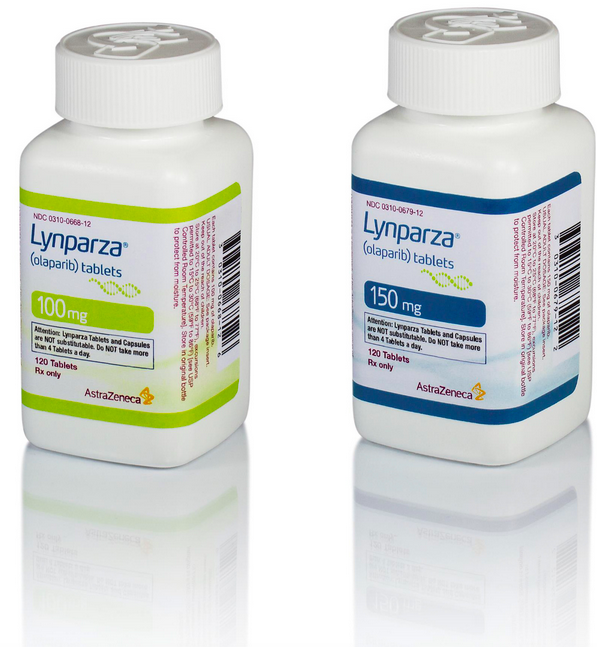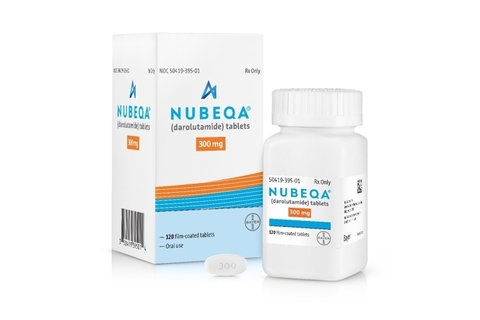Lynparza (olaparib) vs Nubeqa (darolutamide)
Lynparza (olaparib) vs Nubeqa (darolutamide)
Lynparza (olaparib) is a PARP inhibitor used primarily for the treatment of certain types of advanced ovarian, breast, pancreatic, and prostate cancers in patients with specific genetic mutations (BRCA1/2 or other homologous recombination repair mutations). Nubeqa (darolutamide) is an androgen receptor inhibitor specifically indicated for the treatment of non-metastatic castration-resistant prostate cancer (nmCRPC). When deciding between these medications, it is crucial to consider the specific type of cancer, the presence of genetic mutations, the stage of cancer, and the patient's overall health, as Lynparza's effectiveness is tied to genetic markers, while Nubeqa is used in a more targeted stage and type of prostate cancer.
Difference between Lynparza and Nubeqa
| Metric | Lynparza (olaparib) | Nubeqa (darolutamide) |
|---|---|---|
| Generic name | Olaparib | Darolutamide |
| Indications | Ovarian, breast, pancreatic, and prostate cancers with specific genetic mutations (BRCA1/2 or HRR gene mutations) | Non-metastatic castration-resistant prostate cancer |
| Mechanism of action | Poly (ADP-ribose) polymerase (PARP) inhibitor, which leads to DNA damage in cancer cells | Androgen receptor inhibitor, which prevents androgens from promoting tumor growth in prostate cancer |
| Brand names | Lynparza | Nubeqa |
| Administrative route | Oral | Oral |
| Side effects | Anemia, nausea, fatigue, vomiting, respiratory infections, blood count abnormalities | Fatigue, pain in extremities, rash, decreased neutrophil count, increased liver enzymes |
| Contraindications | Hypersensitivity to olaparib, pregnancy, breastfeeding | Hypersensitivity to darolutamide, pregnancy, severe hepatic impairment |
| Drug class | PARP inhibitor | Nonsteroidal antiandrogen |
| Manufacturer | AstraZeneca and Merck (MSD outside the US and Canada) | Bayer |
Efficacy
Lynparza (Olaparib) in Prostate Cancer
Lynparza, also known by its generic name olaparib, is a PARP inhibitor that has shown efficacy in the treatment of prostate cancer under certain conditions. Specifically, Lynparza has been approved for the treatment of men with metastatic castration-resistant prostate cancer (mCRPC) who have deleterious or suspected deleterious germline or somatic homologous recombination repair (HRR) gene mutations. These patients should have previously received enzalutamide or abiraterone. Clinical trials have demonstrated that olaparib significantly delays disease progression and improves survival outcomes in this subset of patients compared to standard treatments.
The efficacy of Lynparza in prostate cancer was highlighted in the PROfound study, a phase III trial that focused on patients with mCRPC who had mutations in HRR genes and who had progressed on prior next-generation hormonal agent (NHA) therapy. The results of this study indicated that olaparib provided a significant benefit in radiographic progression-free survival (rPFS) compared to a control group receiving a physician's choice of enzalutamide or abiraterone. This benefit was particularly notable in patients with BRCA1/2 or ATM gene mutations.
Nubeqa (Darolutamide) in Prostate Cancer
Nubeqa, with the generic name darolutamide, is an androgen receptor inhibitor used in the treatment of prostate cancer. It is specifically indicated for the treatment of non-metastatic castration-resistant prostate cancer (nmCRPC). Darolutamide works by binding to the androgen receptor and inhibiting the growth of prostate cancer cells that depend on androgens for proliferation and survival. Clinical trials have demonstrated that Nubeqa significantly extends metastasis-free survival in men with nmCRPC.
The ARAMIS trial, a pivotal phase III study, assessed the efficacy of darolutamide in nmCRPC patients. The study showed that treatment with Nubeqa substantially increased metastasis-free survival compared to placebo, with a median metastasis-free survival of 40.4 months for darolutamide versus 18.4 months for placebo. Additionally, darolutamide has been associated with a favorable safety profile and a lower incidence of adverse effects related to androgen deprivation therapy when compared to other therapies. This has important implications for patient quality of life and treatment adherence.
Regulatory Agency Approvals
Lynparza
-
European Medical Agency (EMA), European Union

-
Food and Drug Administration (FDA), USA

-
Health Canada

-
Therapeutic Goods Administration (TGA), Australia

-
Medsafe (NZ)

Nubeqa
-
European Medical Agency (EMA), European Union

-
Food and Drug Administration (FDA), USA

Access Lynparza or Nubeqa today
If Lynparza or Nubeqa are not approved or available in your country (e.g. due to supply issues), you can access them via Everyone.org.
How it works

Make an enquiry
Choose the medicine you want to buy, answer a couple of questions, and upload your prescription to speed things up. We’ll get back to you within 24 hours.


Make an enquiry
Choose the medicine you want to buy, answer a couple of questions, and upload your prescription to speed things up. We’ll get back to you within 24 hours.


Breeze through the paperwork
We'll guide you through the required documents for importing unapproved medicine, ensuring you have all the necessary information.


Get a personalized quote
We’ll prepare a quote for you, including medicine costs and any shipping, administrative, or import fees that may apply.


Receive your medicine
Accept the quote and we’ll handle the rest - sourcing and safely delivering your medicine.

Some text on this page has been automatically generated. Speak to your physician before you start a new treatment or medication.
Let's talk
If you have any questions, call us or send us a message through WhatsApp or email:
Contact us




